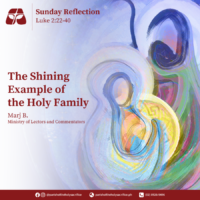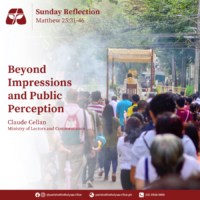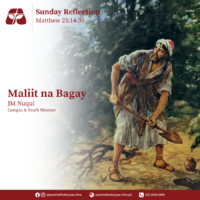Glory to the Father, the Son, and the Holy Spirit
Rex Lago Paras
We have recently concluded the Easter Season and returned to Ordinary Time. In the Philippines, the last two Sundays of Easter are spent celebrating the Ascension of the Lord and Pentecost, respectively. The Solemnity of the Ascension of the Lord and Pentecost Sunday are so intertwined that they are celebrated consecutively in the calendar of our Church.
In one of two Prefaces to the Eucharistic Prayer used during the mass of Ascension Sunday, we hear that “the Lord Jesus, king of glory, conqueror of sin and death ascended…not to distance himself from our lowly state but that we, his members, might be confident of following where he, our Head and Founder, has gone before.” The previous version of this Preface states that “Christ, the mediator between God and man, judge of the world and Lord of all, has passed beyond our sight, not to abandon us but to be our hope.” While these statements acknowledge that our Lord has ‘left’ us, his departure should in no way be construed as an act of desertion. We need only to remind ourselves of the Lord’s assurance: “I will not leave you orphans; I will come to you.” (John 14:18)
Jesus Christ himself tells us that “[a] little while and you will no longer see me.” (John 16:16) Because of this, we “will weep and mourn.” (John 14:20). However, he promises that “a little while later and you will see me [again].” (John 16:16). Then, “[our] grief will become joy.” (John 14:20) The Lord’s Ascension teaches us a lesson in farewells. Leaving is not always good-bye. It is not necessarily an end and is not always bad. In fact, before he ‘left,’ Jesus said, “it is better for you that I go. For if I do not go, the Advocate will not come to you. But if I go, I will send him to you.” (John 16:7) By being taken up into heaven, Christ has gone ahead of us so that he could prepare a place for us. And, when he comes back, he shall take us to himself, so that where he is, we also may be. (cf. John 14:2-3).
Christ “was taken up to heaven…that he might make us sharers in his divinity.” (Preface of the Ascension of the Lord II). Not only that, he ‘left’ us so as to pave the way for a great beginning—the birth of the Church.
On Pentecost, when the Paschal Mystery is brought to its completion, we celebrate not just the coming of the Holy Spirit, but also the great beginning of the Church when people from many languages of the earth were brought together to profess one faith. (cf. Preface of Pentecost).
The mystery of Pentecost imparts, among others, that Christ is true to his word. At Pentecost, a promise is fulfilled. Just as he said, Jesus does not leave us orphans but asks the Father to give us another Advocate to be with us always and to teach us everything. (cf. John 14:16, 27) The Pentecost narrative reveals that the coming of the promised Advocate changed the course of things. The Holy Spirit enabled the apostles to proclaim the Kingdom of God (cf. Acts 2:4) and to continue to preach the word of God with boldness. (cf. Acts 4:31) Those who believed became a community of one heart and mind (cf. Acts 4:32). “They devoted themselves to the teaching of the apostles and to the communal life, to the breaking of the bread and to the prayers.” (Acts 2:42)
During this Year of the Parish, when the focus is on Basic Ecclesial Communities (BECs), it is not too difficult to see parallels in the events that followed Pentecost and the experiences of our BECs. Our Parishes and BECs of today may be separated by several thousands of years from the early Christian communities described in the Acts of the Apostles, but we share the same Holy Spirit. The Holy Spirit that animated the church throughout all Judea, Galilee and Samaria (Acts 9:31) now invigorates us to become truly a “communion of communities.”
Now that our celebration of Easter is ended, we are currently traversing the remaining weeks of what is known as Ordinary Time. This period in the liturgical calendar does “not celebrate a particular element of the mystery of Christ. Rather, especially on the Sundays, these weeks are devoted to the mystery of Christ in its entirety.” (Ceremonial Bishops). Three Solemnities are celebrated within the weeks immediately after Pentecost Sunday. First, Trinity Sunday, which celebrates the mystery of the Triune God, the central mystery of Christian faith and life. (Catechism of the Catholic Church, 234) Second, Corpus Christi Sunday or the Solemnity of the Most Holy Body and Blood of Christ which is also the titular feast of our Parish. Third, the Solemnity of the Sacred Heart of Jesus, which reminds us that the heart of Jesus was “pierced by our sins and for our salvation.” (CCC, 478).
While Ordinary Time is not one of the seasons having their own distinctive character, may we not lose sight of its significance which is still to honor the mystery of Christ in its fullness. (Universal Norms, 43)
Rex Lago Paras is the Chairperson of the Lectors and Commentators Group of the Parish of the Holy Sacrifice.


